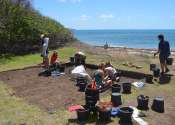Caribbean settlement began in Greater Antilles, researchers say
A fresh, comprehensive look at archaeological data suggests that seafaring South Americans settled first on the large northernmost islands of the Greater Antilles rather than gradually moving northward from the much closer, ...









